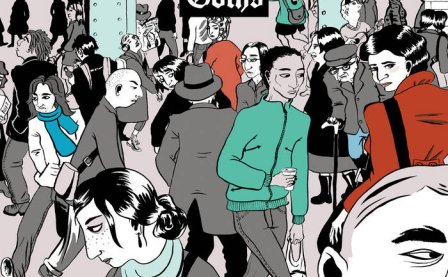It seemed, on the surface, that John Darnielle’s “Satan record,” Transcendental Youth, would be inimical to my Christian sensibilities. In church, I was taught from a young age to fear Satan. Growing up, I was warned in school and in church to fear “Satanists” and their covert influence in “the media,” government, and, especially, in any fun and/or enjoyable thing — especially music. So I rebelled, and I listened to the most evil, aggressive music I could find, religiously. Occasionally, guilt grabbed me by the throat, and I would repent. The pastor of a youth group I infrequently attended/often ditched would receive our stuff, my stuff, whatever it was, and he would destroy it, publicly. Suffice it to say, Christianity has a long (if complicated) history of destroying things, rooted almost entirely in an improper understanding of one’s place in relationship to holiness. Us versus them, and them, and them, ad nauseam. Although we may affirm, in our orthodoxy, that everything can and (perhaps) will be redeemed, our practices negate this conviction at almost every turn: the bad must be broken, and the broken ignored. It was René Girard who, in discussing satan etymologically, revealed satan for what it is: the accuser, the very catalyst for destruction — that is, the anti-Christ.
This counter-witness begins, immediately after the Good Friday crucifixion, on that Saturday when, as Cornel West notes, “God is dead, even for Christians,” when the betrayer-disciple, Judas, hanged himself, despairing and alone. In Eric Severson’s beautiful essay, “Listening on the Day of Silence,” he writes,
If Judas is to find forgiveness and absolution, he is told to find it within the context of his own life… He must move on alone, with no face of love to call him out of a fixation on his despicable failure. Judas came to the priests to save his life, perhaps as a final attempt to rescue a future, however bleak. But Judas is turned away by the coldest and most heartless words of Matthew’s gospel.
What is it to us?
That’s what they said.
What is it to us?
Or, as Darnielle sings in “Harlem Roulette,” “The loneliest people/ In the whole wide world/ Are on the ones you’re never going to see again.”
There is no simple articulation of the Christian faith, but it can be said without reservation that, as Christians, we’ve been willful destroyers and complicit bystanders, ignoring or reinforcing the pain of the world, often calling it good. But this is not a pointless polemic, much less an attempt to evangelize. No, this is the world out of which Transcendental Youth emerges, brutally, and in which so many of John Darnielle’s characters live and breathe and fight to not die: the world in which the roles of Christ and anti-Christ are reversed (and thereby rectified), and in which grace and redemption is found, counter-intuitively, in the defiant incantation of “Hail Satan! Hail Satan!”
Or, as Darnielle sings in “Cry for Judas,” “Unfurl the black velvet altar cloth/ Draw a white chalk Baphomet/ Mistreat your altar boys long enough/ And this is what you get.”
Transcendental Youth is really just one “Satan record” among many in The Mountain Goats’ discography. Anyone who has followed The Mountain Goats for even part of their two-decade-long existence can see the line traced, beginning with “The Doll Song” and scratched and dragged all the way through “Transcendental Youth” — that is, the question upon which much of Darnielle’s output rises and falls: is love kind? This question is being yelled from a particular world in which the image and reality of the father — the symbolic and real father alike, and the worlds they make and erase — demand a response. (Darnielle: “Sing/ In the night/ In the nameless dark/ Father long gone/ But we bear his mark.”) Darnielle responds differently to the question from song to song: yes, maybe, no, sometimes, yes, no, yes. What makes Darnielle a songwriter still worth paying attention to, what makes him, frankly, a great contemporary writer, is his belief (I’m convinced) in the underlying premise: that the pain is worth enduring, because no matter how oppressive the pain inflicted upon the world can be, there is always the possibility of creating something new in midst of it. From the creative reversal comes the love and, from there, the kindness.
The truth is that much of what is called love is unkind, but the moments you’re able to say “yes” and know it begin to make some sense of the endurance. From there, you begin anew.
I’m being redundant on purpose.
Or, as Darnielle sings, “Just stay alive/ Just stay alive.”
So, if you’re John Darnielle, you rewrite the myths and histories, and you reinterpret scripture. You become a good father and try to forgive the one who almost erased you. You tell people, who don’t know what to do, what to do. You shout at them, because the voices that haunt them are loud, and you know they’re loud. “Do what you have to do/ Go where you have to go.” You inscribe a pentagram, in charcoal, on the rubble. “The only church that illuminates is a burning church,” Buenaventura Durutti said. The faithful that can make peace with that sentiment can embrace the “Satan records” and their makers and all the Judases scattered about alike, and know them as beloved, even loving, things. Those who can’t, the paradoxical destroyers, rebuild the walls.
Transcendental Youth is about that moment when you decide to let the rubble be rubble, because it’s better than being the fictive structure.
There is one moment on the album that stands out among all the others, perhaps because it is the first time (to my knowledge) that Darnielle alters his voice. During the chorus of “Until I Am Whole,” one of the few indisputably Washington songs, Darnielle’s voice is processed through a vocoder. It’s a disarming moment not only in its novelty, but in the way in which content and form come to unify a single reality:
When I moved to Washington, for too many reasons, I became very depressed — nearly suicidal. Which was strange, as the final and most significant catalyst for my depression was the suicide of my closest friend from university. She threw herself, I was told, from her apartment window. (Her parents, for religious reasons, denied that she had killed herself, because they believe the suicide [as theoretical abstraction] does not fare well in the afterlife, and is not even deserving of a proper funeral.) The months following were blank and black, and I spent most of my time in an all-consuming fear — of what exactly I’m still unsure, but pieces remain: the dark, heights, and illness. The few consolations I found were in small things: baking, cleaning the house, smoking a cigarette, and listening to music — music I would’ve thrown away in my childhood, but, especially, The Mountain Goats. They were distractions. I would later learn in therapy that distractions subdue those disembodied voices, the ones that shut off the possibilities of survival. They teach you small ways to remain when you’re totally lost to yourself. Whatever strength I could regain and hold on to reminded me, if nothing else, that the living corpse can come back.
In the same song, Darnielle sings, bodied and disembodied voices in tandem, “I think I’ll stay here/ Until I feel whole again/ I don’t know when.”
On one sleepness night, I drove from Washington into Portland, which, I admit, wasn’t a far drive. I got off the freeway and drove down 82nd. I headed west, upon a street I never remembered, toward southeast. When I got there, I drove north on Grand, and then I hit Broadway. In the unreleased song “You’re in Maya,” Darnielle sings about his time in California (near to where I once lived) and his time in Portland (near to where I then lived). One of the things I’ve always loved about Darnielle’s songs were their geographical–and-psycho-geographical precision. Maybe it’s just that we’ve experienced similar places similarly. (I can only retroactively identify with Transcendental Youth.) In one live recording of the same song, Darnielle yelled out the address: “There was nowhere I needed to go/ And nowhere I wanted to be/ And my window at 253 North Broadway looked out on nothing/ And nothing looked right back at me.” I turned on Broadway and stopped. Got out.
Darnielle sings, in one of his most lyrical passages, “Armies massing in the dusky distance/ Ghosted in the ribbon microphone/ Leave a little mark on something, maybe/ Take the secret circuit home/ Nothing in the shadows but the shadow hands/ Reaching out to sad, young, frightened men…”
Take the secret circuit home.
I don’t know why we do the things we do, or think we need to do, in order to survive. I don’t think Darnielle does, either. We just do them, because, for some of us, killing ourselves is still the worse option. If it takes the “Satan records” to reveal and to give dignity to our dark sides, our hidden pain, our loneliness or illness, really, our humanity, and if it takes the Satan records to play out the fact of our loveliness and worth in the midst of it all — the very possibility of our redemption — then maybe it’s time we, who are invested in the figures and symbols of the faith (Darnielle, myself, and millions more), seriously consider illuminating and exposing our inhuman traditions and institutions for what they are: walls of rubble, bound by fear. Transcendental Youth may or may not save a life, but it has a better chance at receiving the outcast listener than the priests who rejected Judas, at the very core of his humanity, sentencing him to the death he carried out himself. Falling headfirst there, his body split open, spilling out all his intestines.
Or, as Darnielle sung, in an old song,
“This church is not long for this world.
This church is not long for this world.
And if you’re wondering who to blame,
I want to praise his name with songs and feasting.
Follow me to the open field
Where the truth will be revealed if you’re really listening.
Hosanna! Hosanna!”
Hail! Hail!
More about: The Mountain Goats




